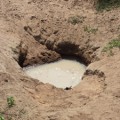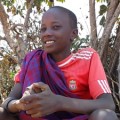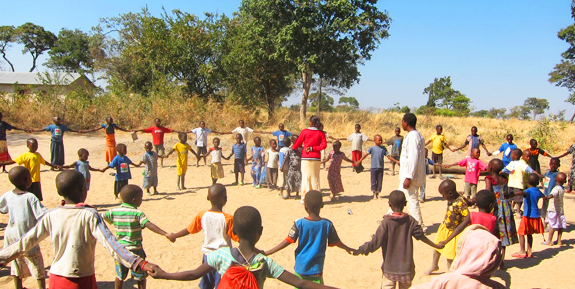By Chinyere Ojini
Editor’s Note: Much has been written about the best way to assist developing communities in desperate need of clean water. Biggest is not always best. Even massive infusions of dollars — from developed-nation to developing-nation — are ineffectual if they are not protected from corruption, or prevented from creating an unsustainable dependency on the donor. We at Pace Academy were inspired to strike up a partnership with the “Clean Water Solution for Isanjandugu” project because the Northern New Jersey Chapter volunteers of Engineers Without Borders are working directly with community members of that small Tanzanian village to develop a sustainable solution to their local water crisis.
From water hole to Isanjandugu children. (Click any pic to view gallery.)
Writing from Isanjandugu, Chinyere Ojini, EWB team leader and Pace Academy EWB liaison, asked us to convey the following: “I would especially like to thank Pace University, the Pace Academy staff, and the student participants in the Walk for World Water last April for making this trip possible. Without you, we wouldn’t have been here, so you all are responsible for much of our success! And thanks for allowing me to contribute to EarthDesk!”
In her Letter from Isanjandugu, Part One (EarthDesk, September 4), Chinyere wrote about her journey from interested student to feet-on-the-ground worker. In Part Two, she continues her story with observations and advice born of first-hand experience. — John Cronin
“We exist!”
As another example of the continuous gratitude of the Isanjandugu villagers, during the farewell meeting one of the elder women in the community thanked the group for taking the time to not only take the long trip from the U.S. to the community just to consider their water issue, but for specifically traveling throughout the extremely large and spaced out village to see where and how they lived. It made her feel like we recognized every villager and that, even from the U.S., we now know that they exist. She asked us to spread the word about their existence when we return home, so that more people will know about the struggles in Isanjandugu village.
Success and beyond
I’m very proud of the travel team for the work we were able to accomplish during this time period…especially since everything runs on Tanzania time (my preferred M.O. actually). =) I kept a list of lessons learned throughout the trip that we will include in our post-assessment trip report, but to name a few…
- Disinfectant wipes can’t be flushed here. (I destroyed the septic system. Yikes!)
- Don’t expect Internet access until your third day here, so make your family aware of that before you leave.
- Learn more Swahili before you come! It can only help!
- You won’t study Swahili on the plane, so don’t procrastinate, then plan for it! We flew Emirates and their entertainment system is wayyy too elaborate to think you’ll want to study!
- Bring collapsible mosquito nets.
- Ensure your bug spray has DEET (else it will be ineffective).
- Car sick people can’t come! (We were lucky. Sorry to discriminate, but you won’t make it out here on these 10-hour trips on dirt roads!)
- Everyone operates on Tanzania time! 8 a.m. means 11 a.m., but you still have to be ready at 8 in case they are actually on time!
- Ensure you’re on a schedule with your malaria medicine! (The team had to remind me every day (except one) to take my pills. I’m not used to taking meds!)
- Purchase flights two months before for the best price. Emirates is the most reliable, comfortable airline.
- Have visas ready one month before your flight to avoid Chinyere from having anxiety attacks up until the flight! (One team member picked his up the day before! I won’t say any names, Alex!) =)
- Take short showers to reserve water use and the environmental impact of your stay.
- Expect not to have hot water to shower everywhere we stay, but look for the switch in your bathroom to turn on the water heater if there is one.
- Credit cards are null and void. Cash is king!
- All meals will be 12 different types of carbs! (That was from Bob. I love carbs!)
Aside from my team, I was also extremely satisfied with the hospitality we received from the Precious Blood Brothers in every location we stopped throughout Tanzania. And a special thanks goes out to Father Chrissogoni, who is the mission priest assigned to Manyoni, who also did an amazing job assisting with this trip. He, Father Mapinduzi, and a number of other priests always kept the entire team laughing.
For example, during an interview of one of the herder’s children yesterday, Father Mapinduzi asked the son to select a wife among us and I was chosen! (Yay me! Sorry Katie!) As part of this semi-arranged marriage, I would receive 20 cows (the maximum according to the Tanzanian scale). I tried to apply my Nigerian negotiation skills here and up the ante to 50 cows, but I was reminded by Father Mapinduzi that I was in Tanzania and no negotiation takes place here, so I was at least satisfied to have received the maximum number on the scale. My suitor also offered to build a house for me in Manyoni town (the nearby city). How many American guys can offer that?! Unfortunately, he was only 16, so that clearly wouldn’t work regardless! If he had found me an older son, I might have totally reconsidered!
Devota, a 12 year-old girl with sickle cell anemia, was always the first of the children to greet us.
During the questionnaires, we learned so much more about the community in regard to other struggles they deal with. The stories that touched me the most were from…
- Devota, a 12-year-old girl with sickle cell anemia, who had to drop out of school due to the distance and her health condition, which also strains the family financially. She was always the first of the children to boldly come up and greet us, which is why I chose to interview her.
- A woman who moved to the village four years ago to escape her physically abusive husband in Manyoni struggles to rebuild her life on her own in the village.
- A successful herder with 18 children, 3 wives, more than 200 cows, 20 goats, 4 donkeys and a large number of chickens, who also does business in the city and wants to learn to read and write.
These stories and many more made me realize I will continue to work in that village until I’ve done everything I can to help improve the villagers’ lives and until I’m satisfied that I’ve completed God’s work. However, even with every single other issue I’ve discovered on this trip, maji (water) is a struggle that most affects every single person in the village.
Now that the assessment trip is coming to an end, we have to bring our research back to the U.S. to discuss the next steps for the team back home in regard to what type of clean water project we will we decide to do, how many phases we will incorporate, etc. We hope to be back in the community by next year and provide a temporary solution to the water problem via clay water filters until we are able to complete the well. The timeline is to complete the project by 2000-and-ASAP, but our fundraising efforts will determine that.
If you would like to help the “Clean Water Solution for Isanjandugu” project, please donate at the project’s Charity Web page here.















